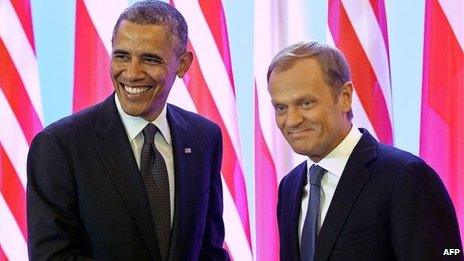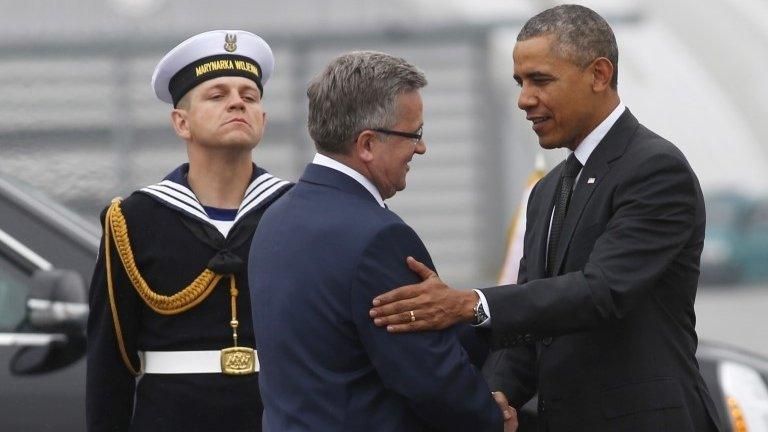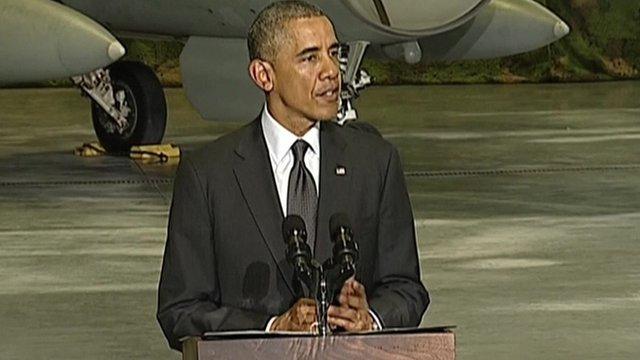Obama in Europe shows the limits of US power
- Published
- comments

Obama, shown with Polish PM Donald Tusk, will warn Putin to curb his territorial ambitions, but is unlikely to give a rousing speech
Whether he likes it or not, President Barack Obama's trip to Europe will be about Ukraine, Vladimir Putin and American power.
He may not stoop to pick up the geopolitical gauntlet thrown down by the Russian leader. He probably will set out new red lines - warning Mr Putin not to mess with Nato.
But it should worry the White House that nobody is expecting anything much more than words that will be blown away by the next wind. No "tear down that wall", no "Ich bin Kyvian".
By Friday, he'll be on a Normandy beach marking the anniversary of D-Day. There could be no starker reminder of what America means to Europe. Without US power, Hitler might have won. And if he'd been beaten it would have been by the Soviet Union, and most of the continent would have been under Moscow's sway.
As it was, Europe ended up the main chess board for the Cold War game, a contest for strategic supremacy between the US and Russia.
President Obama's first stop was Poland, to celebrate the anniversary of the birth of the Solidarity movement, external which led the country in shaking off communism and foreign domination.
It is a reminder of the earthquake that happened at the end of the last century, the background to the Ukraine crisis that must not be forgotten.
Three former Soviet states are now independent countries, part of the European Union. Others, like Ukraine, are eager to join.
Red lines
Just about all of the Soviet Union's key allies, which used to be behind what Churchill called "the iron curtain", are now leading members of the EU. All of the countries that made up the Soviet anti-Nato alliance, the Warsaw Pact, are now in Nato - apart from Russia itself.
It is little wonder that Mr Putin, who regards the collapse of the Soviet Union as the greatest tragedy of the last century, doesn't want any more of the East joining the West.
So Mr Obama's tone is important. He will warn Putin that there are clear limits on his ambition to claw back territory and influence. Speaking in front of US warplanes, external, he said, "As friends and allies we stand united together."
He's promised to ask Congress for $1bn to beef up the defence of Europe. So far, so tough.
But his West Point speech made it clear that while defending allies was a core reason for taking action, "a willingness to rush into military adventures" was to be avoided even when events "push the world in a more dangerous direction but do not directly threaten us".
That is perhaps an eminently sensible place to draw a red line. But it is not of very great comfort to people in Ukraine, let alone Georgia and Belarus, which are outside the Nato alliance and are likely to stay outside - precisely because existing Nato countries don't want to fight on their behalf.
That is a reflection of the will of their citizens - foreign fighters may be going to Syria out of faith and passion, but I see no one raising an International Brigade to fight for the Western cause in Ukraine.
After Iraq, few leaders want to get ahead of the will of the people when it comes to war. Few can sound the trumpet like President Obama - but he doesn't blow those resounding notes much these days.
In tailoring his rhetoric to reflect reality, he shines a light on the limits of American power.
- Published3 June 2014

- Published3 June 2014
